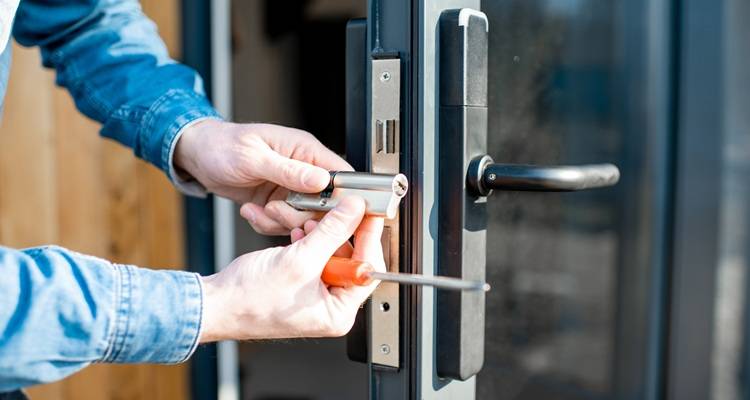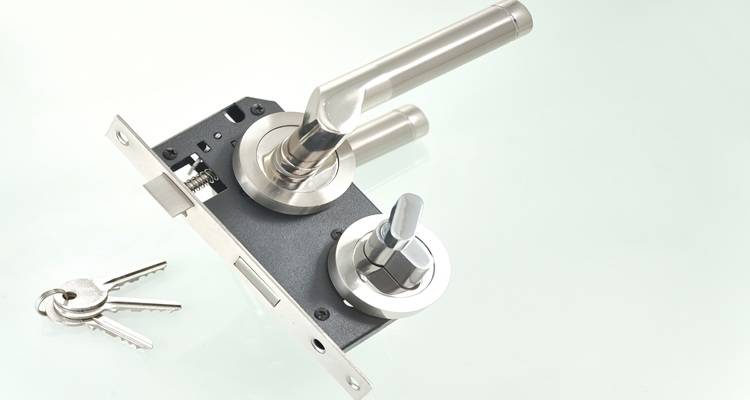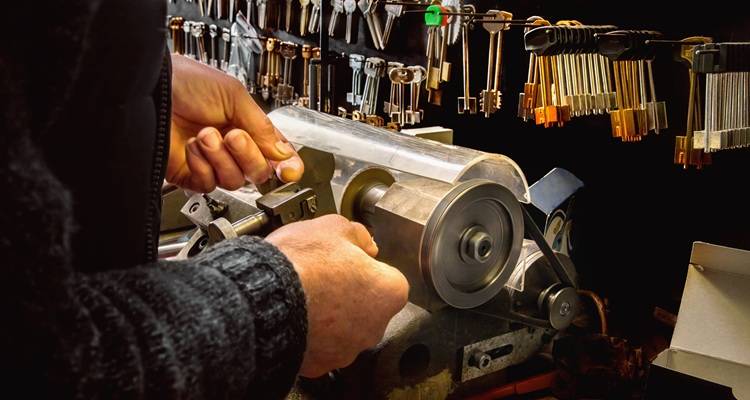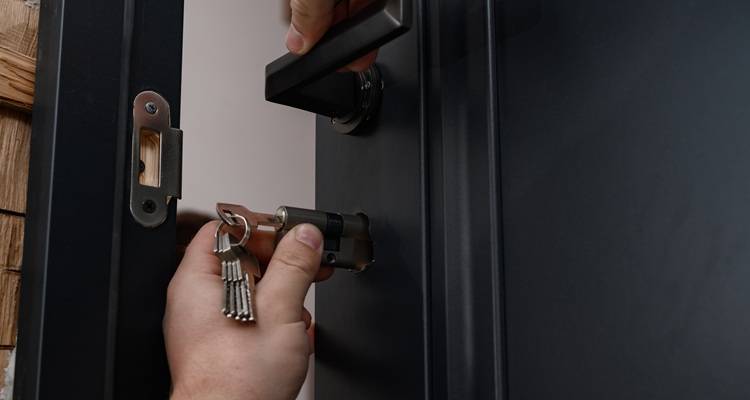How to Become a Locksmith
Locksmiths are an essential trade, specialising in maintaining building security, from residential to commercial. If you’re looking to become a locksmith, there are plenty of routes to take.
What does a locksmith do?
- Installs, repairs, and maintains lock systems for homes, businesses, and vehicles.
- Provides 24/7 emergency lockout services for people locked out of their homes, businesses, or vehicles.
- Performs security upgrades on buildings to enhance the occupants’ safety.
In 2024, locksmiths ranked second among the most in-demand trades in the UK behind plumbers. Whether it’s lost keys, security concerns, or property maintenance, there will always be a demand for locksmiths.
Becoming a locksmith is an excellent choice if you’re looking for a flexible career with the potential for steady work.
So, if you want to know how to be a locksmith, keep reading!

Table of Contents
Qualifications & Training
How do I become a locksmith?
The locksmithing industry lacks regulation, and because of this, you don’t need a formal qualification to work as a locksmith. However, training is highly recommended to help you build credibility and trust with your clients - especially if you’re hoping to become a self-employed locksmith.
Let’s look at the different types of locksmith training in the UK:
Locksmith Training Courses
The Master Locksmiths Association (MLA) is the UK’s largest locksmith trade association. They lead locksmith training courses for a range of experience levels, from beginners in the industry all the way to top-up skill sessions for established locksmiths.
In these locksmith training courses, you’ll practice hands-on training, including hand lock-picking, key-cutting, and learning to fit, install, and maintain a range of door locks.
The MLA’s Locksmith Qualification Programme is perfect for locksmith newcomers and is suitable for people with little to no experience. After completing this course, you’ll earn a Level 4 certificate in General Locksmithing Skills, the highest locksmithing qualification in the UK.

Earning this qualification helps locksmiths become Qualified Master Locksmiths (QML) or an MLA-approved company. After earning this status, you can use the MLA’s logo on your website or other promotional material to demonstrate your qualifications and credibility as a locksmith, helping to build your profile as a trusted locksmith.
Locksmith Apprenticeships and On-the-Job Training
Another route into the locksmithing industry is through on-the-job training and apprenticeships. Working under an experienced locksmith can provide invaluable practical skills and show you how a self-employed locksmith operates day to day, giving you essential tips and tricks right from the very start.
To find locksmithing apprenticeships, you can look up established locksmithing companies in the UK and check whether they are hiring. It’s also worth checking the National Careers Service locksmith page to see if any live apprenticeships are listed.
For learning-on-the-job opportunities, Timpson offers a 4-week internal training program in general locksmithing and refresher training at regular intervals during your contract.
Skills Needed
So, what skills do I need to become a locksmith?
Here’s what you need to have if you want to start your career in locksmithing:
Problem-solving Attitude
Locksmiths are problem-solvers by trade, whether it’s a lost key, a broken lock, or being locked out of a vehicle. You’ll need to think on your feet and devise a solution to your client’s problem.
A troubleshooting mindset will help you find solutions for various lock issues. If you’re genuinely curious about problems and how to fix them, locksmithing can be a great career.
Technical Knowledge
Understanding different types of locks - from mechanical to electronic and smart locks - will form an essential cornerstone in your locksmithing career. You’ll learn about the technical aspects of locks and how they operate through your training.

As well as locks, you’ll need to be comfortable with manual and automatic key-cutting processes to help your clients regain access after they’ve been locked out of their properties or vehicles. This knowledge, paired with your problem-solving attitude, will help you to find the best solutions for different scenarios.
Attention to Detail and Manual Dexterity
Key patterns and locks are intricate, so attention to detail is essential - especially when cutting keys by hand and repairing lock mechanisms. Getting this right is crucial, as incorrect installation or repairs can leave your client susceptible to break-ins or theft or them having to foot the bill for an expensive lock replacement.
This attention to detail also requires a high level of manual dexterity. Keys and lock components can be incredibly small and fiddly, and you’ll need to be precise if you want to fix them correctly with a steady hand.
Customer Service and Timekeeping
As a locksmith, you’ll work directly with clients, so good customer service skills are essential. What’s also useful is the ability to empathise with clients when they’re stressed or upset due to a break-in, theft, or lost key, as these can be high-stress situations where you’ll need to keep your cool in order to get the job done.
Good timekeeping skills are essential, too, especially if you’re hoping to become a self-employed locksmith. Being self-employed means you largely set your own timetable and schedule, so you’ll need to get to and from the premises in a timely manner.
Tools & Equipment
Now that you know the required skills, let’s look at the main tools you’ll need as a locksmith.
If you plan on becoming a self-employed locksmith, you’ll have to pay for these yourself. If you work for a locksmithing company, they’ll typically provide the tools and equipment for you.
Because of this, self-employed locksmiths have a higher cost of entry, while employed locksmiths benefit from their employer’s tools and equipment.
Lock Picks and Tension Wrenches
You’ll need a lock pick and a tension wrench to pick a lock without a key.
Lockpicks are designed to manipulate the pins inside a lock to unlock it without needing a key, and you’ll use them with a tension wrench to hold the pins in place while picking the lock. When you’ve picked the lock, the tension wrench rotates the lock’s cylinder, opening the lock.
There are different types of lock picks:
- Hook Picks: For single-pin picking, starting at £3.
- Rake Picks: These are for multiple-pin picking simultaneously, from £9 to £50.
- Ball Picks: From £4 to £19.
The cost of lockpicks will vary depending on the brand, quality, and whether they’re individual items or part of a larger lockpicking kit.
Tension wrenches range in price from £6 to £50+. Lockpicking kits include a variety of lock picks and tension wrenches to suit many different types of locks.
Key-cutting Machines
To cut new and replacement keys, you’ll need a key-cutting machine. THM is the UK’s dedicated key-cutting supplier and a reputable place to buy locksmithing machinery.

Let’s look at the costs of entry-level and advanced key-cutting machines:
- Entry-Level Key-Cutting Starter Package: Starting at £795 + VAT, this includes a portable dual-purpose cylinder and mortice key-cutting machine. It has two key boards with 370 of the most popular cylinder keys and 290 of the most popular mortice keys.
- Dual-Purpose Key-Cutting Machines: Starting at £945 + VAT, this is a permanent key-cutting machine, suitable for cylinder and mortice key duplication.
- Automatic Key-Cutting Machines: Starting at £8,900 + VAT, suitable for cutting and engraving cylinder, security, and vehicle keys in one machine.
Bypass Tools
Before switching to a last-resort drill, you can use bypass tools to try to open a lock without damaging the mechanism. This will be a good option if you have a client who’s lost their key to a specific lock and wants to gain access.
Bypass tools start at around £11.99 for bypass lock shanks for push-button code locks.
Drills and Screwdrivers
If you’re working on a severely damaged lock, you might need a drill or screwdriver to gain access.
Screwdrivers can remove jammed locks without permanently damaging them, but drilling destroys the lock, and your client will need a lock replacement if you use this method.
How to Gain Experience
One of the best ways to gain experience as a locksmith is to shadow an experienced locksmith to learn real-world techniques. This will give you visibility into a locksmith’s day-to-day activities, learning how to mitigate scenarios and how to problem-solve in high-pressure situations.
Taking locksmithing training courses will give you hands-on experience in various environments, from learning how to manually cut a new key to simulated lock-picking exercises where you’ll be tasked with picking a lock with nothing more than a lock pick and tension wrench.

It’s wise to work for a locksmithing company before becoming self-employed, as this will give you the tools, skills, and knowledge that can only be gained by doing the job. By taking this route, you can take your time to learn everything you need to know about the industry and any job quirks before taking a leap into running your own business and list of clients.
Having this experience on your CV will help you build your client base when you choose to become a self-employed locksmith, as potential customers can see your experience and are more likely to choose you when given the option between years of experience and someone new on the scene with no real-life experience in locksmithing.
Setting Up as a Locksmith
If you’ve decided the time is right to set up as a self-employed locksmith, you have a few choices to make. The first is whether you want to be a sole trader or a limited company.
How to Register as a Sole Trader
Key Facts:
- Sole traders must register as self-employed with HMRC.
- Sole traders pay income tax and National Insurance on any business profits, calculated by an annual tax return which is submitted to HMRC.
- Sole trader’s financial records are private.
The current rate of income tax is:
- £0 - £12,570 - 0% tax
- £12,571 - £50,270 - 20% tax
- £50,271 - £125,140 - 40% tax
- £125,141+ - 45% tax
As a sole trader, you (the business owner) and the business itself are legally the same entity. This means you are personally responsible for any business debts - also known as unlimited liability.
Setting up as a sole trader is the best option if you want to work for yourself without the extra paperwork and regulations that come with becoming a limited company, with just one tax return to file each year.

How To Register as a Limited Company
Key Facts:
- Limited companies must register with Companies House and file annual business accounts.
- The company pays corporation tax on profits.
- The directors (the person/persons who are responsible for running the business) also pay income tax and National Insurance on salaries and dividends.
- Limited company financial records are public.
The current rate of corporation tax is:
- >£50,000 - 19% small profits rate
- £250,000+ - 25% main rate
Limited companies act as separate legal entities from their owner and have limited liability, meaning personal assets are protected from business debts. Shareholders are only liable for the amount they’ve invested in the business.
Setting up a limited company is a good idea if you’ve been self-employed and want to grow your business and make more efficient tax choices if you’re earning over £50,000.
Whichever route you choose, you’ll need the following insurance:
- Public Liability Insurance: This covers you if someone says they have been injured or had their property damaged due to your business. For example, if you leave your locksmithing tools out and the property owner steps on them, you could use your insurance to cover any potential legal proceedings.
- Professional Indemnity Insurance: This covers you if a customer accuses you of providing “negligent services or poor advice”, which leads to them losing income or damaging them as a business.
Once you’ve set your business up, you can start advertising your services. The best way of doing this is by:
- Creating a Website: List your locksmithing services, noting your availability, costs, and location. Make sure your locksmith training is visible, as well as any customer reviews you may have, to help build a picture of your credibility in the industry. Post pictures or videos of completed jobs to show the breadth of your skills and services.
- Utilising Social Media: Word-of-mouth marketing is great, but for a quick, high-impact reach, you can use social media to attract new clients. Join local groups in your area and post about your trade, letting potential customers know what you can offer and your prices. Capture footage or photos of yourself while you work to give your potential customers a face behind the company name.
- Joining Local Business Directories: Optimise local marketing materials, such as weekly or monthly leaflets, and get your company listed as a trader in the area. Ask for your business card to be displayed at local newsagents or cafes to broaden your reach in your local area.
Be sure to join professional locksmith associations to help build trust with potential customers. This is especially important if you’re just starting in the trade, as you can also glean industry knowledge and tips from established locksmiths.
Earnings & Career Prospects
Trainee locksmiths earn £18,000 per year, with established locksmiths earning between £30,000 to £35,000 per year in the UK.
You can earn more as a locksmith by offering 24/7 emergency call-out services, which are charged at a premium. If you work in London, you’re more likely to earn more than someone in the same trade in the north of the UK due to fluctuations in the cost of living.

To develop your earnings further, you can specialise your skills. Smart lock installation is gaining popularity, and automotive locksmithing is a particularly high-value skill.
For greater job security than starting as a sole trader straight out of training, you can choose to join established locksmithing companies to have support and mentoring in your first few years in the trade.
However, if you’ve worked as a self-employed locksmith for a few years, you might consider starting a limited company and employing staff to grow your business and raise your earning potential.








